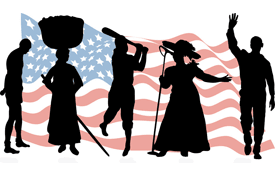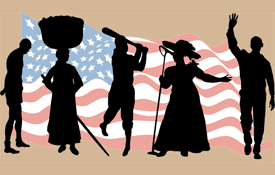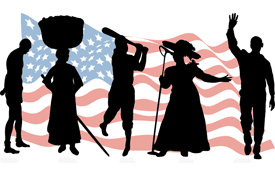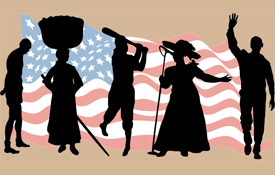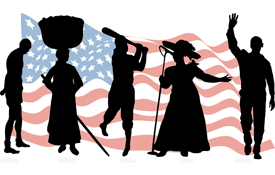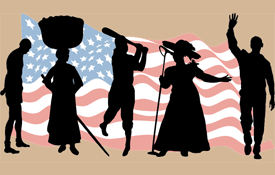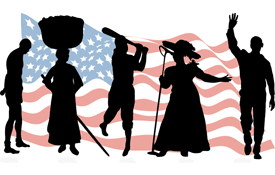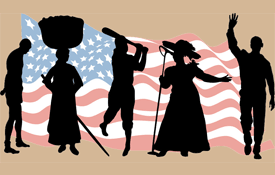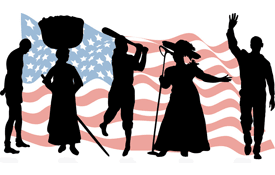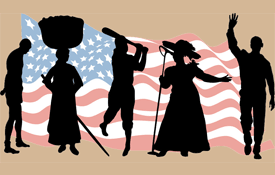Categories
-
0 The Best Way to Discover Black History
- Commentary
- by Hugh Smith
- 02/28/2007
Today, everyone seems to receive their 15 minutes of fame, whether they deserve it or not. Our memories are short, so it's good to be reminded from time to time about true originals who created their own models for success. For this reason alone, the information that circulates during Black History Month is well worth keeping in front of global audiences. Do you know someone who lacks a depth of knowledge about African American contributions? I certainly do, that’s why we all can benefit from the focused stories about black history people during the month long February celebration. I remember taking Asian/African history as an elective while a senior in high school, a course quite rare at the time. Lerone Bennett Jr.'s book, Before the Mayflower, one of the main textbooks in the course, opened up a new world inside of my sixteen year old mind. Philadelphia, Pennsylvania is now the first major city in the USA requiring a course in black history as a graduation requirement for all high school students. Here's a not so surprising revelation: some of the teachers in Philly observe that they are learning more than they think they've taught (about significant African American contributions) to their students. The Philadelphia initiative is not without controversy, as debate continues about the value of segmenting black history into a box, at the expense of a multicultural approach. All cultures can benefit from the experiences of others, we just have to respect what others bring to the table too. Expanding our approach to consuming black history breaks apart what I call the one dimensional mold - that of viewing the center of past African American history as just social crusades by select individuals against discrimination. So how do you soak in more stimulating ideas from diverse history makers while relaxing stress free at the same time? How do most people do it? How do you do it? For some, it's reading. For others, it's listening, For most, it's watching - because all of our senses are activated when the visual eye is in the lead. Subscribe to our YouTube Channel, and watch the yearly Black History Month videos we have posted to the home page at BlackHistoryPeople.com.
-
0 Black History Month Quiz and Trivia Challenges
- Commentary
- by Hugh Smith
- 02/27/2007
Rosa Parks, Martin Luther King Jr., Coretta Scott King, Sojourner Truth: instantly recognizable personalities when you think about contributions from important black Americans. Robert S. Abbott, Jill Brown, and Ernie Davis were on the front lines too - but they may not immediately come to mind. How do you mix the famous, the familiar, and the forgotten when talking about brilliant pioneers during Black History Month, so the event stays fresh? Black history month activities always seem to revolve around the same circle of noteworthy people. Nothing is the matter with this, except the danger of potential boredom or apathy from non-history fans. The February tribute comes around each year, so creative ways have to be used to keep it relevant in contemporary times of social advancement across the races. When Dr. Carter G. Woodson created Negro History Week in 1926, he chose the second week of February between the birthdays of Frederick Douglass and Abraham Lincoln. In 1976, Black History Month was born. A laundry list of first achievers gets stale as a pure informational exercise, yet there's always new discovery going on for the uninformed. Lectures, articles, and books can bridge the gap. But what are the other options? One of the best ways to introduce Black History Month material is in the form of a quiz or trivia. Mixing topics with a broad range of interest from beginner to advanced will keep the trivia fun and interesting benefiting a wide range of readers. Subject material from the centuries of Richard Allen, Marion Anderson, Oprah Winfrey, and other African Americans will grab the attention of different age groups. The Internet lends itself to interactive participation when it comes to quizzes. Players can provide feedback to rate the various questions. Quiz participants can get the answers to questions right away. Contenders can listen to audio hints with background information about the questions. Reading a static article is one thing, but interacting with the same material in several dimensions is dynamic. Black History Month Quiz and trivia challenges offer this magic element. We love traditions, so I'd expect that Black History Month will be around for another 100 years, whether the need for it remains relevant or not. As an institution, this February event will have to keep reinventing itself in new and creative ways to conquer our society's short attention span for inspiring historical information.
-
0 Journalist Frederick Douglass Honored
- News
- by Hugh Smith
- 02/26/2007
On Monday, February 26, a plaque was unveiled in the U.S. House of Representatives Press Gallery in Washington, DC honoring civil rights activist Frederick Douglass (1817-1895). Best known for his support of the Abolitionist (anti-slavery) movement, Douglass spent most of his career as a journalist. He founded the North Star, an African American newspaper, in 1847. He was the first black reporter allowed into the Capitol press galleries. Journalists watch laws being created on the floors of the House and Senate from the press galleries. Douglass was instrumental in urging President Abraham Lincoln to use black troops in the Civil War. During Reconstruction after the war, Frederick Douglass kept the African American community informed about what was really happening in Congress.
-
0 5 Black History Comics Comment Constructively using Laughter
- History
- by Hugh Smith
- 02/21/2007
Contemporaries Dave Chapelle, Chris Rock, Whoppi Goldberg, and Eddie Murphy have entertained millions with their antics, laughter, and fun. Their unique styles draw inspiration from the great comedians that came before them. When vocal African American funnymen and women observe the world, black history stories become anything but depressing. Let's take a look back, and recall 5 "old school" greats. These are the legendary crafty commanders of wit. Each fused social commentary together with entertaining quips to produce fabulous "standup" routines. 1) Comedy legend Jackie "Moms" Mabley, (1898-1975), began her career in 1923. She opened for such greats as Count Basie, Duke Ellington, Louis Armstrong, and Cab Calloway. Mabley didn't record her first album until 1960, but it turned into a gold record, generating over one million dollars in sales. She'll forever be remembered for her comedic genius. 2) Redd Foxx (1922 - 1991), was really hardcore hilarious. I was lucky enough to see him live in a nightclub setting before he became big on television (starring in Sanford and Son). If Stanford and Son was rated G, Foxx's live act was definitely rated X, (or R by today's standards). Foxx is one of the most influential comics of all time. 3) Richard Pryor (1940 - 2005), is also remembered as a comedic genius. If you listened closely to his bits, Pryor was always slipping in some gritty social commentary between the laughs. Here's one of my favorite Pryor routines: "I went to see Logan's Run right, they had a movie of the future called Logan's Run, I said well white folks ain't planning for us to be here!" 4) Dick Gregory. When I originally wrote this article, I neglected to include perhaps the strongest social activist to use comedy as a catalyst to express change. Born in St. Louis Missouri (1932), Dick Gregory is best known today as an author, nutritionist, and civil rights leader. He started his career as a comedian, and found humor in the adversity of the poverty of his youth. 5) Bill Cosby was the first African American actor to receive an Emmy Award (1966) for his role in the television series "I Spy." The Philadelphia native continues to be extremely successful as a comedian, actor, writer, producer, and critic of eubonics (loosely defined as African American jargon). Honorable mentions to Flip Wilson, Nipsey Russell, Sinbad, Jimmy Walker, Franklyn Ajaye, George Wallace, and Arsenio Hall for their contributions to black history laughter through the years. 2018 Update: Dick Gregory, (1932 - 2017).
-
0 Patient Nurses Contribute Healing to Black History Story
- Medicine
- by Hugh Smith
- 02/19/2007
Health care has had a long history of participation by blacks, although years ago, the professional opportunities were limited. Let's look through the pages of Empower Encyclopedia and BlackHistoryPeople.com to discover three black history people who moved nursing forward. Mary Elizabeth Mahoney, (1846-1926), is credited with being the first African American to graduate with a diploma in nursing. In 1879, she received her degree from the New England Hospital in Boston. Dr. Daniel H. Williams, (1856-1931), founded the first medical training school for African American nurses. Dr. Williams also opened the first interracial hospital in 1891 (Provident Hospital in Chicago, Illinois, USA). Hazel W. Johnson was Chief Nurse for the Army Medical Command in Korea. As a Brigadier General she headed the U.S. Army Nurse Corps. Johnson was the first African American woman to obtain the rank of General. Need an idea for a Black History Month project? Give Mahoney, Williams, and Johnson a further look. The need for nurses is at an all-time high. These trailblazers made significant contributions to nursing, a field that can barely keep up with today's growing demand.
-
0 Black History People Visionaries and Pioneers
- History
- by Hugh Smith
- 02/15/2007
"What did Barbara Jordan do for us?" "I need a report on Diana Ross" "Something on Frederick Douglass" "Do you have information on Malcolm X?" These are four actual questions from among the many we received in the past week! Yes, it is hard to find reliable information about African American visionaries and pioneers. Here are 26 twentieth century personalities responsible for moving the American Dream forward you need to know about (in random order): Langston Hughes Marian Anderson Thomas Bradley Dr. Ralph J. Bunche Coretta Scott King Frederick Douglass Dr. Charles Drew Sammy Davis Jr. Shirley Chisholm Jesse Owens James Meredith Ella Fitzgerald William H. Hastie Richard Wright Malcolm X Diana Ross Charles H. Houston A. Philip Randolph Andrew Young Barbara Jordan Ronald Dellums Bo Diddley Rosa Parks Duke Ellington Lena Horne Joe Louis If you'd like to learn more about these achievers, (and you've signed up for our free black history biographies via email...and have confirmed your subscription), then you'll be among the first to be able to benefit from an exciting new project profiling these African American legends coming soon.
-
0 SNCC, Black Power, and Stokely Carmichael
- History
- by Hugh Smith
- 02/09/2007
Kwame Ture, also known as Stokely Carmichael, (1941-1998), was born in Trinidad. He grew up in both New York City and Washington, D.C. Carmichael graduated from Howard University in the nation's capitol in 1964. A member of the Nonviolent Action Group, (NAG), Carmichael also worked with SNCC, the Student Nonviolent Coordinating Committee. He joined SNCC in 1960 and became Chairman of the group in 1966. From 1968-1969, Carmichael served as the Prime Minister of the Black Panther Party. Stokely is credited with popularizing the phrase, "black power." He was an advocate of the black power movement, a promoter of solidarity with Latin America, and a Pan Africanist (arising from Pan Africanism: the belief that Africa is one country despite the artificial borders created by the European powers who carved up the continent). Carmichael compared his self described "black American revolution," to the Palestinian revolution. He criticized the intention of white liberals because of his interpretation of their refusal to embrace violence to impact change. Stokely married the African singer, Miriam Makeba.
-
0 10 Top Black History People Links
- Website
- by Hugh Smith
- 02/06/2007
Are you looking for trustworthy online sources of information about famous black history people? Start by signing up for our free Empower Encyclopedia biographies. Here are 10 links: Autherine Lucy Foster Bessie Coleman Bill Cosby Charles Hamilton Houston Frederick Douglass George Washington Carver Malcolm X Mary McLeod Bethune Patricia R. Harris Maya Angelou Primarily from universities, these are some great Black History Month resources. Sign up for our free biographies. Remember that Black History Month is not just about the famous. Valuable contributions from all people of color should be in the spotlight. 2018 update. University websites constantly change and never update or redirect links, so 1 - 8 on our list no longer work, but 9 and 10 do as of January 27, 2018.
-
0 Joe Louis Boxing Gloves K.O. Smithsonian
- Sports
- by Hugh Smith
- 02/01/2007
On Wednesday, January 31, 2007, Joe Louis' famous boxing gloves were donated to the Smithsonian National Museum of American History in Washington, DC. Listen to the BlackHistoryPeople.com production of Joe Louis' historic second fight with Max Schmeling. A Windsor, Ontario Canada collector donated the gloves (worn in the first Louis - Schmeling encounter, which Louis lost). The family making the donation had the gloves in their possession for over 70 years! The Smithsonian already had the towel tossed in the ring to end the June 1938 rematch, along with other related items. As a special Black History Month treat, listen to our special production featuring my narration and hear how Joe Louis made boxing history.
-
0 Diversity Data Explores USA Melting Pot
- News
- by Hugh Smith
- 01/30/2007
We often think of black history in terms of past achievements by exceptional individuals. If you wanted a broad general snapshot of most African American people today, the trends in their neighborhoods, and the factors that will influence the emerging black leaders of tomorrow, where would you turn? A new website has created an extremely easy way to discover information about racial and ethnic groups in the USA by using census data gathered by the U.S. government. According to the creators, "Diversity Data is an online tool for exploring quality of life data across different metropolitan areas, for people of different racial/ethnic groups in the United States.” Diversity Data “provides values and rankings for the largest U.S. metropolitan areas on different indicators in 8 areas of life (domains), including demographics, education, economic opportunity, housing, neighborhoods, and health." Just pick a state, select a metropolitan area, then instantly observe what the trends reveal. By using an option called "customize profile," you can dissect and analyze the information in more ways than you could ever imagine. Each state can be searched by selecting from the largest counties. The brainchild of this fantastic free tool is the Harvard School of Public Health. I highly recommend Diversity Data for: Population Demographics and Diversity Health Housing Opportunities Economic Opportunities Education Residential Integration and Neighborhood Characteristics Crime Physical Environment Where are the rural or urban centers in the USA where different racial and ethnic groups are striding ahead? You'll discover the answer to this question and a lot more by digging into Diversity Data online. The trends reflect possible history in the making. If you spot differences in your state that are surprising, let the information challenge you to think about some ways you might influence your community’s destiny.
